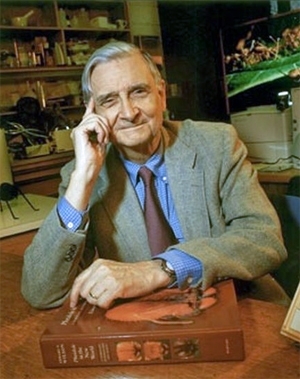Appendix II: Biography of Edward O. Wilson (The Future of Life (Lecture))
The Future of Life: Biography of Edward O. Wilson
| Topics: |
This content is not assigned to a topic
|
Series: The John H. Chafee Memorial Lecture on Science and the Environment
2nd National Conference on Science, Policy and the Environment
Primary Speaker: Dr. Edward O. Wilson
Date: December 6, 2001
Location: Smithsonian National Museum of Natural History, Washington, DC
Dr. Edward O Wilson, Pellegrino University Research Professor Emeritus at Harvard University, is one of the most highly respected scientists in the world today. Hailed as “the new Darwin” by Thomas Wolfe and one of “America’s 25 Most Influential People” by Time magazine, he has twice received the Pulitzer Prize (one for The Ants and a second for On Human Nature). He has been honored with the highest scientific award in the field of ecology, the Crafoord Prize from the Royal Swedish Academy of Sciences, and he received the U.S. National Medal of Science. His best-selling book, The Diversity of Life, which brought together knowledge of the magnitude of biodiversity and the threats to it, made him a leader in the environmental movement and an advisor on preservation legislation at the highest levels of the U.S. government. For his conservation work he has received the Audubon Medal of the National Audubon Society and the Gold Medal of the World Wide Fund for Nature. He has received in total some 75 awards in international recognition for his contributions to science and humanity and is the recipient of 27 honorary doctoral degrees form North America and Europe.
He is a pioneer in the field of sociobiology and one of the most sought after science lecturers in the world. His accomplishments include pioneering work on chemical communication in the 1950s to 1970s, featuring a first comprehensive account of pheromones in ants, and (with William H. Bossert) a first evolutionary analysis of the physical and chemical properties of pheromones; the creation (with Robert H. MacArthur) of the theory of biogeography, a basic part of modern ecology and conservation biology; the creation of the discipline of sociobiology, in 1975; the first modern syntheses of knowledge of social insects (1971) and (with Bert Hölldobler) of ants in particular, in 1990. He also edited the volume Biodiversity, which in 1988 introduced the term and launched worldwide attention to the subject. In 1984, with Biophilia, he introduced the concept of a genetically based tendency to affiliate and bond with parts of the natural world. Today he continues entomological and environmental research at the Museum of Comparative Zoology. His most recent book, The Future of Life (2002), offers a plan for saving Earth's biological heritage.
|
|

0 Comments